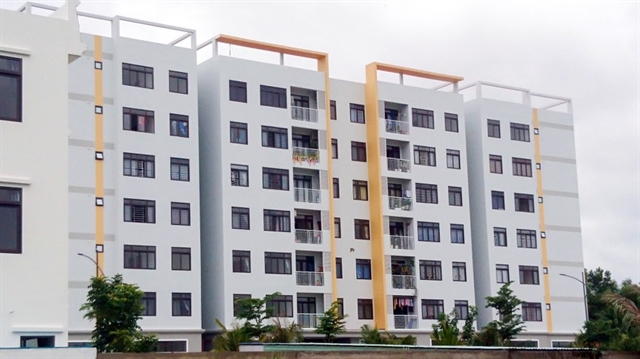Investors need to balance price, quality to succeed in social housing market
Investors who plan to participate in Việt Nam's social housing market in the future should balance selling price, construction quality and sustainability factors to succeed in the market, experts said.
 |
|
A social housing project in Cần Thơ City. Expert suggests investors to balance selling price and quality when developing the social housing projects. — Photo from Internet |
Investors who plan to participate in Việt Nam's social housing market in the future should balance selling price, construction quality and sustainability factors to succeed in the market, experts said.
A recent report entitled “Việt Nam Social Housing 2023 – A Home for All” from Cushman & Wakefield Vietnam revealed that Việt Nam will reach a population of 100 million people by 2023, putting the country at 15th worldwide and the third most populous country in the ASEAN region, behind only Indonesia and the Philippines. Meanwhile, the urbanisation rate of the whole country has increased from 20 per cent in 1993 to 41.7 per cent in 2022.
“The rapid urbanisation process contributes to economic growth, but also widens the gap between rich and poor. Average house prices in Việt Nam are currently about 20 times higher than the annual per capita income, making it increasingly difficult for Vietnamese to own a home. This situation requires rebalancing solutions, and one crucial step can be the full-fledged development of social housing as a tool to ensure social security and promote the sustainability of the real estate market,” said Trang Bùi, country head of Cushman & Wakefield Vietnam.
Since then, the country has taken initiatives to realize this goal and help people improve their quality of life, through efforts to build 1 million social housing units and housing for workers; a plan to deploy a VNĐ120 trillion credit package to develop social housing projects and housing for workers; amend the Law on Housing 2014 to add favorable policies and attractive incentives; and other relevant policies to promote social housing development.
“Demand for housing is very important for the sustainable development of the real estate market as well as economic growth. It is important for developers to conduct thorough research and feasibility studies before starting a project. The Government's efforts to promote affordable housing are commendable, although available land, infrastructure connectivity, better policies and a financial structure are needed to create the necessary driver for the sector and play a key role in the development of social housing to successfully provide a home for all over the next decade,” Trang said.
As of the first quarter this year, Việt Nam has completed 301 social housing projects in urban areas and worker housing projects in industrial zones, with a total scale of nearly 156,000 units. About 401 projects are about to be built, with a total scale of about 454,000 apartments. However, the supply for this type of housing has not been fully met compared to the demand. According to a survey by the Ministry of Construction, the demand for social housing for low-income workers in industrial zones is about 2.4 million units for the period 2021 - 2030.
“The total existing stock and future supply is equivalent to 51 per cent of total demand. The market is still short more than 1 million units,” Trang added.
Currently, the majority of social housing projects in Việt Nam are developed by domestic developers. Highlighted names are HUD Vietnam, BIC Vietnam and Him Lam in the northern region. The central region has Xuân Phú Hải, Saigon Invest Group and Vicoland; And the south has Nam Long, Hoàng Quân, Sacomreal and many other investors.
In 2023, the Hà Nội market is expected to welcome 6,117 social housing units in 11 projects. Meanwhile, HCM City also plans to build 3,800 more apartments in six projects, according to data from the project, "Investing in building at least one million social housing apartments for low-income people, industrial park workers in the period of 2021-2030".
Cushman & Wakefield Vietnam said that although the law for investors has changed a lot, there are still many difficulties and inadequacies on the buyer's side. During the registration process to buy social housing, buyers have to wait to submit a series of documents to prove their eligibility to buy social housing. This lengthy and complex process makes access to social housing increasingly difficult for people with real, urgent housing needs. Background checks are also a concern as there have been cases of developers selling social housing units to people who are not on the eligible list.








